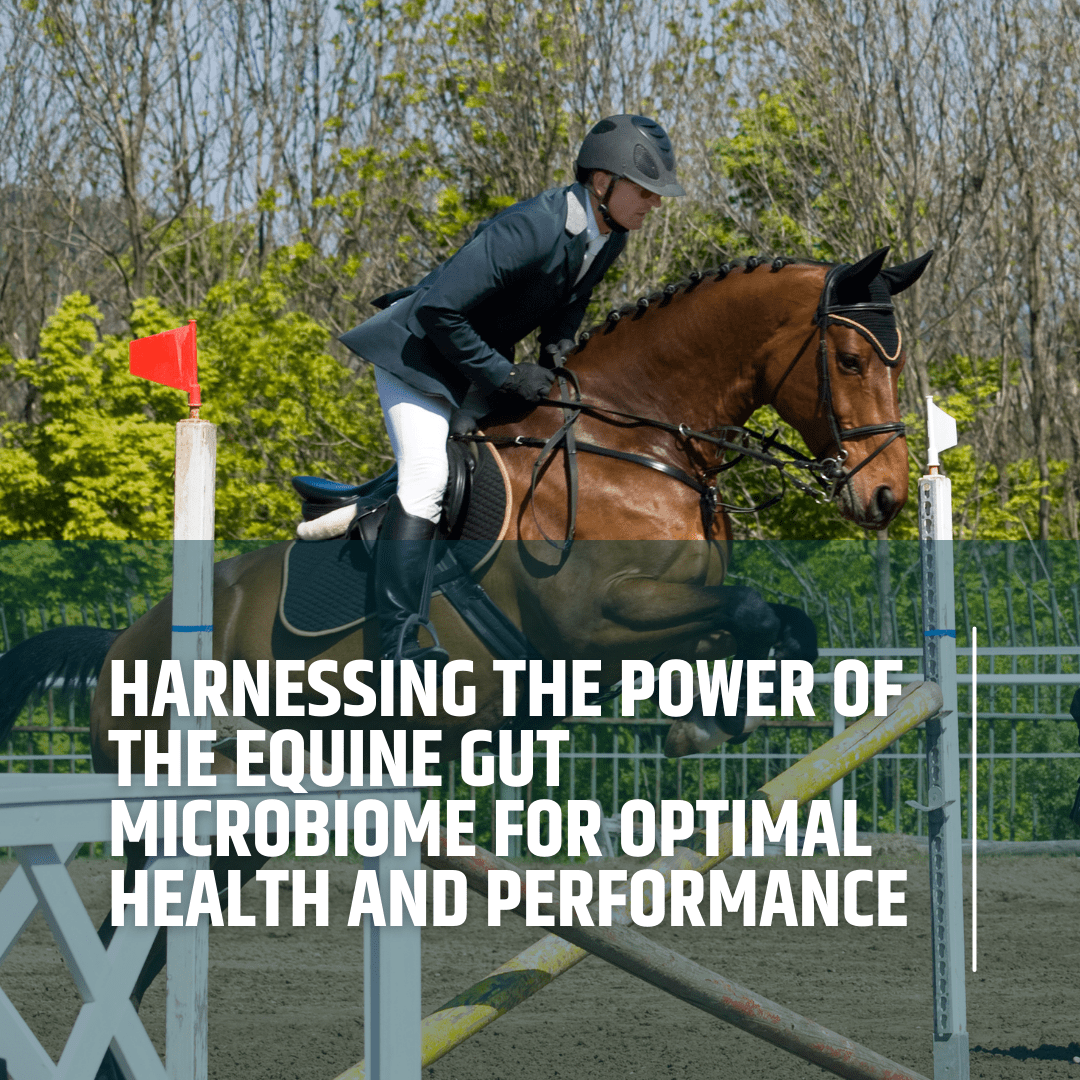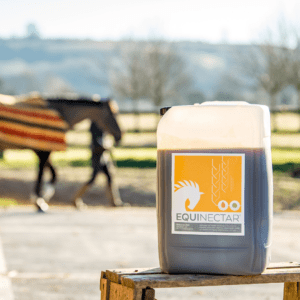

Ben Nedas
Chief Commercial Officer
Harnessing the power of the equine gut microbiome for optimal health and performance
01
Introduction: a new frontier in equine health
The gut microbiome, a complex and dynamic community of microorganisms, plays a crucial role in the overall health and functionality of its host. In horses, understanding the gut microbiome has become a pivotal aspect of veterinary science, with research highlighting its influence not only on physical health but also on performance, behaviour, and emotional well-being. This blog aims to discuss the equine gut microbiome and provide practical insights for horse owners to optimise their management strategies.
03
Dietary influences on the gut microbiome
The equine diet plays a critical role in shaping the gut microbiome. Changes in the diet can lead to significant shifts in the microbial population, affecting everything from nutrient digestibility to immune response [4]. For example, the level of forage lignification (the amount of woody tissue in the plant) can alter the gut's bacterial composition, impacting how well dietary nutrients are utilised. It is essential for horse owners to consider the individual microbiome of their horse when designing diet plans, as each horse may require slightly different nutritional strategies to thrive.
04
Environmental and management factors
The living environment and daily management of horses also influence the gut microbiome. Studies, such as those conducted by Tavenner et al. (2020), suggest that horses living in semi-feral conditions might have a more 'natural' and potentially healthier microbiomes, compared to those in conventional conditions [7]. This research underscores the importance of considering how factors like housing, exercise, and social interaction can impact gut health and, by extension, the overall health and behaviour of the horse.
05
Broader implications for mood and behaviour
The gut microbiome's influence extends beyond physical health, impacting mental well-being through the gut-brain axis. This connection involves a bidirectional communication network that links the emotional and cognitive centres of the brain with peripheral intestinal functions. Research in humans and other animals has demonstrated that changes in the gut microbiome can affect the production of neurotransmitters and hormones, influencing mood and behaviour [8][9][10][11][12][13]. These findings are highly relevant to horse owners, as they suggest that managing the gut microbiome could help mitigate stress, improve mood, and enhance cognitive functions in horses.
06
Is EquiNectar useful for my horse?
Given the intricate relationship between diet, gut health, and the microbiome, EquiNectar can be a valuable addition to your horse's diet. EquiNectar is not a prebiotic or probiotic but a supplement providing essential digestive enzymes like amylase, fructanase, phytase, xylanase, cellulase, and beta glucanase. These enzymes help break down starches, fructans and other feed components in the small intestine, preventing undigested particles from reaching the hindgut, where they could disrupt the microbial balance. By enhancing digestive efficiency, EquiNectar helps optimise the gut microbiome, potentially improving nutrient absorption, performance, and mood stability in horses.
07
Conclusion: a paradigm shift in equine care
The emerging research on the equine gut microbiome offers profound insights into how microorganisms influence health, behaviour, and performance. By integrating these findings into daily management practices, horse owners can significantly enhance the well-being of their horses. As more is learned about the horse's gut, it seems like there are a lot of ways that nutrition and the environment could be used to help.
References
[1] C. Li, X. Li, R. Guo, W. Ni, K. Liu, Z. Liuet al., "Expanded catalogue of metagenome-assembled genomes reveals resistome characteristics and athletic performance-associated microbes in horse", Microbiome, vol. 11, no. 1, 2023. https://doi.org/10.1186/s40168-022-01448-z
[2] N. Mach, C. Midoux, S. Leclercq, S. Pennarun, L. Moyec, O. Ruéet al., "Mining the equine gut metagenome: poorly-characterized taxa associated with cardiovascular fitness in endurance athletes", Communications Biology, vol. 5, no. 1, 2022. https://doi.org/10.1038/s42003-022-03977-7
[3] S. Narváez, "Improved equine fecal microbiome characterization using target enrichment by hybridization capture", Animals, vol. 14, no. 3, p. 445, 2024. https://doi.org/10.3390/ani14030445
[4] A. Gomez, A. Sharma, A. Grev, & K. Martinson, "The horse gut microbiome responds in a highly individualized manner to forage lignification",, 2020. https://doi.org/10.21203/rs.3.rs-27270/v1
[5] A. Biddle, J. Tomb, & Z. Fan, "Microbiome and blood analyte differences point to community and metabolic signatures in lean and obese horses", Frontiers in Veterinary Science, vol. 5, 2018. https://doi.org/10.3389/fvets.2018.00225
[6] R. Gilroy, A. Ray, E. Adriaenssens, A. Oren, D. Baker, R. Ragioneet al., "Metagenomic investigation of the equine faecal microbiome reveals extensive taxonomic diversity", Peerj, vol. 10, p. e13084, 2022. https://doi.org/10.7717/peerj.13084
[7] M. Tavenner, S. McDonnell, & A. Biddle, "Development of the equine hindgut microbiome in semi-feral and domestic conventionally-managed foals",, 2020. https://doi.org/10.21203/rs.3.rs-53473/v1
[8] T. Bear, J. Dalziel, J. Coad, N. Roy, C. Butts, & P. Gopal, "The microbiome-gut-brain axis and resilience to developing anxiety or depression under stress", Microorganisms, vol. 9, no. 4, p. 723, 2021. https://doi.org/10.3390/microorganisms9040723
[9] S. Flowers, K. Ward, & C. Clark, "The gut microbiome in bipolar disorder and pharmacotherapy management", Neuropsychobiology, vol. 79, no. 1, p. 43-49, 2019. https://doi.org/10.1159/000504496
[10] I. Koutromanos, "Gut microbiome in alcohol use disorder: implications for health outcomes and therapeutic strategies-a literature review", World Journal of Methodology, vol. 14, no. 1, 2024. https://doi.org/10.5662/wjm.v14.i1.88519
[11] L. Vitetta, M. Bambling, & E. Strodl, "Probiotics and commensal bacteria metabolites trigger epigenetic changes in the gut and influence beneficial mood dispositions", Microorganisms, vol. 11, no. 5, p. 1334, 2023. https://doi.org/10.3390/microorganisms11051334
[12] S. Mörkl, M. Butler, & S. Lackner, "Advances in the gut microbiome and mood disorders", Current Opinion in Psychiatry, vol. 36, no. 1, p. 1-7, 2023. https://doi.org/10.1097/yco.0000000000000829
[13] A. Ameen, "Dysfunction of the gut microbiome and its onset progression of chronic and mental health disorders", PJMHS, vol. 17, no. 5, p. 425-429, 2023. https://doi.org/10.53350/pjmhs2023175425
ABOUT EQUINECTAR
Description
EquiNectar® is a natural feed supplement, that is scientifically proven to:
- Re-balance your horse’s gut bacteria
- Help your horse maximise benefits from its feed
- Improve your horse’s condition
More information
EquiNectar® is produced by Tharos Ltd in the UK. It is a natural source of digestive enzymes and contains only the following ingredients:
- Our patented enzyme rich malt extract
- Medium chain triglycerides (from coconut oil)
- Potassium sorbate
For more details of the enzymes within EquiNectar® take a look at the ingredients and enzymes page.
How to feed
Simply add EquiNectar® to your horse's daily feed, using the Feeding Rate chart to determine the correct amount.
For detailed instructions about how to introduce EquiNectar, please read the comprehensive Feeding Guide page.





